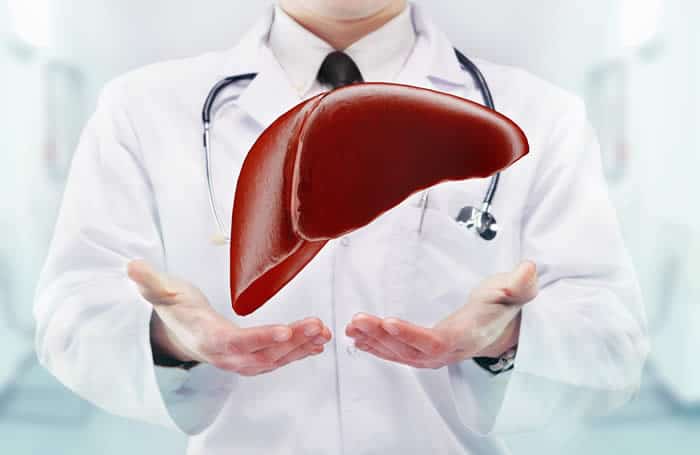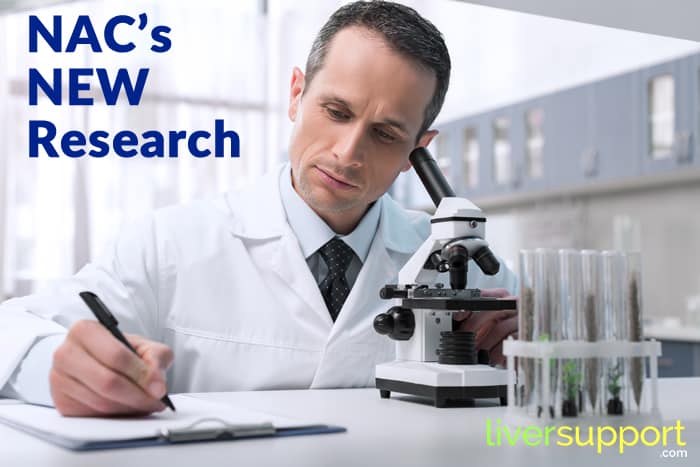
Previous
First FDA-Approved Drug to Treat This Symptom of Rare Liver Disease

Next
How Fiber Helps Your Liver
NAC’s New Research
Find out about the research supporting NAC’s potential new health benefit.
Sometimes, remedies known to advance health in one area are also found to promote health in another.
Take minoxidil, for instance. Although this drug was originally created to help reduce blood pressure, it was soon noticed that patients taking it also experienced hair growth. (1) Now it is better known for its role in helping people who are fighting hair loss as it is the active ingredient in ROGAINE products.
While its history might not be so dramatic, another remedy that appears to have numerous health benefits, including boosting liver health and potentially easing COVID-19, is NAC.
What Is NAC?
NAC is short for N-acetyl cysteine (though, sometimes it is written as one word: N-acetylcysteine). It is a precursor of the non-essential amino acid L-cysteine, which it assists by scavenging free radicals. NAC is considered a “powerful antioxidant” that helps stimulate the production of glutathione as well as promoting detoxification. (2)
NAC for Liver Health
Numerous studies have found that NAC helps bolster liver health.

One example is research published in 2017 that involved 80 patients with non-acetaminophen-induced acute liver failure. This is liver failure that occurs for reasons other than taking toxic levels of acetaminophen.
One-half of the patients received NAC and the other half served as a control. Those receiving NAC had shorter hospital stays. They also had a 28% decrease in mortality when compared to the group that did not receive NAC. (3)
A 2015 meta-analysis of four clinical trials reported a positive correlation between NAC and liver health as well. Specifically, it noted that individuals taking NAC had greater chances of liver survival, both with the liver they were born with and a transplanted liver. Researchers further concluded that NAC is safe for non-acetaminophen-induced acute liver failure. (4)
All of this is good news for patients with reduced or compromised liver health, prompting some to pursue NAC supplementation.
But newer research suggests that this antioxidant may also play a role in the fight against the novel coronavirus known as COVID-19.
New Research: NAC and COVID-19
In 2020, the journal Therapeutics and Clinical Risk Management published an evidence review that suggested that NAC may help fend off COVID-19 due to its ability to “loosen thick mucus in the lungs” while also boosting immune health, inhibiting the virus from replicating, and reducing inflammation. (5)
This review presented evidence of past research studies that have demonstrated that NAC inhibits replication of other viruses, such as those related to influenza and the human immunodeficiency virus (HIV).
Another evidential review, this one published in 2021 in the Journal of Inflammation Research, agrees. It also adds that, since NAC has already been used and tested for decades, firmly establishing its health-based properties while also proving that it is safe to take, this should “significantly hasten” the ability to incorporate this antioxidant in the treatment of COVID-19. (6)
Conclusion
Currently, several studies are underway to determine the effects that NAC may have on the coronavirus. Some are looking at whether it can help prevent COVID-19 from progressing in severity; others want to know if it could help patients with a severe case of COVID who are not responding to other forms of treatment.
As the results come in, we will begin to learn more about the true power of this antioxidant for supporting optimal health and wellness – even while in the midst of a pandemic.
(1) Bryan, J. (2011, July 20). How Minoxidil Was Transformed from an Antihypertensive to Hair-Loss Drug. The Pharmaceutical Journal. Retrieved August 11, 2021, from https://pharmaceutical-journal.com/article/news/how-minoxidil-was-transformed-from-an-antihypertensive-to-hair-loss-drug
(2) Mokhtari, V., Afsharian, P., Shahhoseini, M., Kalantar, S., Moini, A. (2017, Apr-Jun). A Review on Various Uses of N-Acetyl Cysteine. Cell Journal. doi:10.22074/cellj.2016.4872
(3) Nabi, T., Nabi, S., Rafiq, N., Shah, A. (2017, May-Jun). Role of N-Acetylcysteine Treatment in Non-Acetaminophen-Induced Acute Liver Failure: A Prospective Study. The Saudi Journal of Gastroenterology. doi:10.4103/1319-3767.207711
(4) Hu, J., Zhang, Q., Ren, X., Sun, Z., Qizhen, Q. (2015, October). Efficacy and Safety of Acetylcysteine in “Non-Acetaminophen” Acute Liver Failure: A Meta-Analysis of Prospective Clinical Trials. Clinics and Research in Hepatology and Gastroenterology. doi:10.1016/j.clinre.2015.01.003
(5) Shi, Z., Puyo, C. (2020). N-Acetylcysteine to Combat COVID-19: An Evidence Review. Therapeutics and Clinical Risk Management. doi:10.2147/TCRM.S273700
(6) Wong, K., Lee, S., Kua, K. (2021, February 24). N-Acetylcysteine as Adjuvant Therapy for COVID-19 – A Perspective on the Current State of the Evidence. Journal of Inflammation Research. doi:10.2147/JIR.S306849






